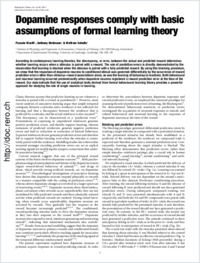Dopamine responses comply with basic assumptions of formal learning theory
- Waelti, Pascale Institute of Physiology and Programme in Neuroscience, University of Fribourg, Switzerland
- Dickinson, Anthony Department of Experimental Psychology, University of Cambridge, UK
- Schultz, Wolfram Institute of Physiology and Programme in Neuroscience, University of Fribourg, Switzerland
-
2001
Published in:
- Nature. - 2001, vol. 412, p. 43-48
English
According to contemporary learning theories, the discrepancy, or error, between the actual and predicted reward determines whether learning occurs when a stimulus is paired with a reward. The role of prediction errors is directly demonstrated by the observation that learning is blocked when the stimulus is paired with a fully predicted reward. By using this blocking procedure, we show that the responses of dopamine neurons to conditioned stimuli was governed differentially by the occurrence of reward prediction errors rather than stimulus−reward associations alone, as was the learning of behavioural reactions. Both behavioural and neuronal learning occurred predominantly when dopamine neurons registered a reward prediction error at the time of the reward. Our data indicate that the use of analytical tests derived from formal behavioural learning theory provides a powerful approach for studying the role of single neurons in learning.
- Faculty
- Faculté des sciences et de médecine
- Department
- Département de Médecine
- Language
-
- English
- Classification
- Medicine
- License
-
License undefined
- Identifiers
-
- RERO DOC 6018
- DOI 10.1038/35083500
- Persistent URL
- https://folia.unifr.ch/unifr/documents/300256
Statistics
Document views: 222
File downloads:
- pdf: 756
